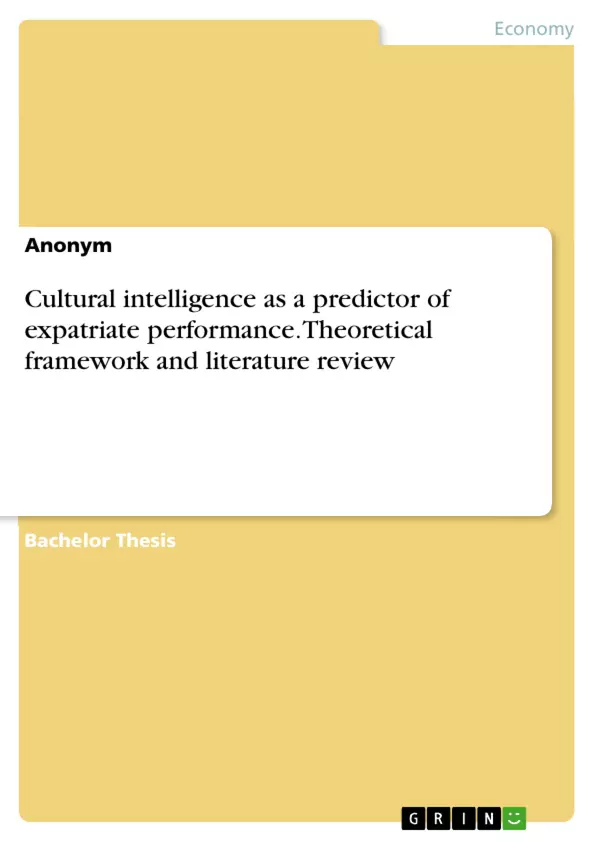This thesis describes the acknowledged construct of cultural intelligence and its extensive role regarding performance in international assignments. The literature review examines the direct influence of cultural intelligence, its moderating and mediating character, and the concept of cultural adjustment as well as the recently investigated predictors that are cultural effectiveness, prior expatriate experience, pre-departure training and support.
The thesis attempts to create a comprehensive model that exhibits the relevant linkages and provides an overview over the role of cultural intelligence concerning employee’s performance in international assignments.
Inhaltsverzeichnis (Table of Contents)
- Introduction
- Theoretical framework
- The concept of cultural intelligence
- Definition and conceptualization
- The four dimensions of cultural intelligence
- Expatriation and employee performance in global assignments
- Expatriates - Role and Definition
- Performance in cultural diverse settings
- Cultural intelligence and expatriate job performance - Interconnections, antecedents and predictors
- Establishing the link between cultural intelligence and performance
- The concept of cross-cultural adjustment
- Further predictors – Cultural effectiveness, experience, training and support
- The concept of cultural intelligence
- Methodology and Approach
- Results
- The direct influence of cultural intelligence on expatriate job performance
- The impact of cultural intelligence on performance
- The four facets of cultural intelligence and performance
- Cross-cultural adjustment, cultural intelligence and performance
- The interconnection between cultural intelligence, cross-cultural adjustment and performance
- Cross-cultural adjustment as a mediator of cultural intelligence
- The role of cultural effectiveness, experience, training and support
- Developing a comprehensive model
- The direct influence of cultural intelligence on expatriate job performance
- Implications for action
- Conclusion
Zielsetzung und Themenschwerpunkte (Objectives and Key Themes)
This thesis aims to investigate the role of cultural intelligence in international assignments. The literature review explores the direct influence of cultural intelligence on expatriate performance, as well as its moderating and mediating character. Additionally, it examines the concept of cultural adjustment and other predictors, including cultural effectiveness, prior expatriate experience, pre-departure training, and support. The thesis attempts to create a comprehensive model that illustrates the relevant linkages and provides an overview of the role of cultural intelligence in employee performance in international assignments.
- Cultural intelligence and its relationship to expatriate performance
- The role of cultural adjustment in the relationship between cultural intelligence and performance
- Other predictors of expatriate performance, including cultural effectiveness, experience, training, and support
- Developing a comprehensive model of the linkages between cultural intelligence, cultural adjustment, and other predictors of expatriate performance
- Practical implications for employees and human resource management
Zusammenfassung der Kapitel (Chapter Summaries)
The introduction provides an overview of the topic and the rationale for the study. Chapter 2 presents the theoretical framework, discussing the concept of cultural intelligence, expatriation, and employee performance in global assignments. It explores the relationship between cultural intelligence and expatriate job performance, examining the concept of cross-cultural adjustment and other relevant predictors. Chapter 3 outlines the methodology and approach used for the literature review. Chapter 4 presents the results of the study, analyzing the direct influence of cultural intelligence on expatriate job performance, the interconnection between cultural intelligence, cross-cultural adjustment, and performance, and the role of other predictors. Chapter 5 discusses implications for action based on the findings. Finally, Chapter 6 provides a concluding summary of the research.
Schlüsselwörter (Keywords)
The main keywords and focus topics of this thesis include cultural intelligence, expatriate performance, cross-cultural adjustment, cultural effectiveness, expatriate experience, pre-departure training, and support. The study examines the relationship between these factors and aims to provide a comprehensive understanding of the role of cultural intelligence in international assignments.
- Quote paper
- Anonym (Author), 2013, Cultural intelligence as a predictor of expatriate performance. Theoretical framework and literature review, Munich, GRIN Verlag, https://www.grin.com/document/1036996



